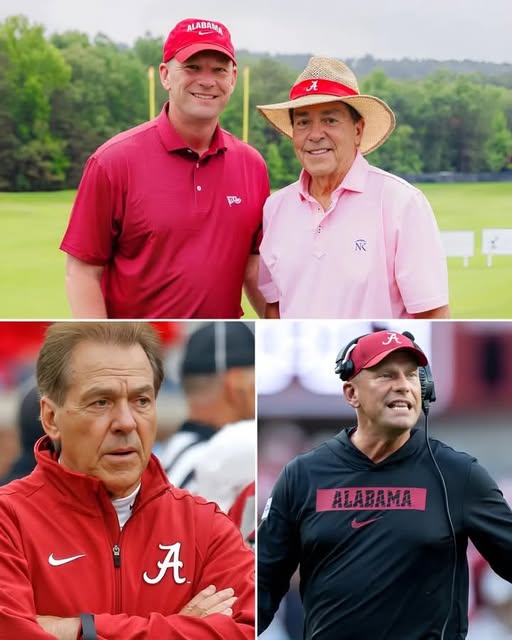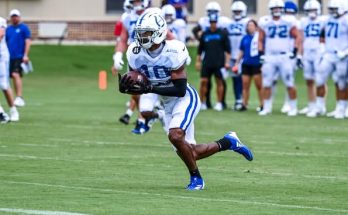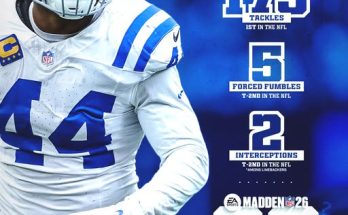When Kalen DeBoer took the stage at his introductory press conference as the 28th head football coach in University of Alabama history, he didn’t stumble over clichés or vague platitudes. He didn’t lean on nostalgia or offer poetic tributes to the past. Instead, he looked squarely into the camera, into the faces of the assembled media, players, and staff, and delivered a message that reverberated through Tuscaloosa and the entire college football world:
“At Alabama, it’s about winning championships. That’s why I’m here.”
In those eight words, DeBoer captured not only the essence of the Crimson Tide football program but also his own coaching identity—ambitious, calculated, and unafraid of expectations. Replacing Nick Saban, a man who brought six national titles to Alabama and fundamentally reshaped the college football landscape, would be an unenviable task for almost anyone. But Kalen DeBoer was never interested in comfort. He was interested in legacy.
From Sioux Falls to Seattle: The Rise of a Coaching Powerhouse
Before he arrived at Alabama, DeBoer built an impressive résumé. A native of Milbank, South Dakota, DeBoer was a prolific wide receiver at the University of Sioux Falls before embarking on a coaching journey that began at his alma mater. There, he went an astonishing 67–3 over five seasons, winning three NAIA national championships.
His climb through the coaching ranks included impactful stints as offensive coordinator at Eastern Michigan, Fresno State, and Indiana before landing the head coaching job at Fresno State in 2020. In 2022, he took the reins at Washington, where he truly burst onto the national scene.
DeBoer led the Huskies to an undefeated regular season in 2023 and an appearance in the College Football Playoff National Championship Game, ultimately falling to Jim Harbaugh’s Michigan Wolverines. But the message was clear: DeBoer could build a title contender quickly, even outside traditional blue-blood programs.
So when Nick Saban announced his retirement in January 2025, DeBoer’s name was on Alabama’s shortlist from the very beginning.
Choosing Alabama: The “Why” That Shocked No One
In his first few days in Tuscaloosa, DeBoer was asked repeatedly why he would leave a flourishing situation at Washington—a team he had rebuilt and elevated in short order—for the pressure cooker that is Alabama football.
His answer was direct and unflinching:
“It’s about winning championships. That’s the standard here. You don’t come to Alabama to rebuild or be satisfied with 10 wins. You come to win it all.”
To many, that quote echoed the Saban era’s guiding principle: The Process. Yet, it wasn’t mimicry. DeBoer wasn’t trying to be Nick Saban 2.0. He was crafting his own vision for the Crimson Tide—one that honored the past but embraced the future.
“Coach Saban is the GOAT,” DeBoer acknowledged. “But I’m not here to replicate him. I’m here to build on what he created and push it forward. Same goal. New journey.”
Earning the Locker Room: “We Felt His Presence Immediately”
One of the early challenges DeBoer faced was earning the trust of a locker room filled with top-tier talent—many of whom were recruited by and deeply loyal to Saban.
Junior linebacker Deontae Lawson spoke candidly about the transition.
“At first, we didn’t know what to expect. Coach Saban is all we’ve ever known. But Coach DeBoer came in with this calm intensity. He didn’t try to win us over with hype. He showed us his plan. And we felt his presence immediately.”
That presence included individual meetings with every scholarship player, the retention of key support staffers, and a commitment to developing personal relationships—not just athletic results.
In today’s transfer portal era, retaining a roster after a coaching change is nearly as important as recruiting new talent. DeBoer struck a balance between keeping core players and selectively adding playmakers from the portal, including former Washington wideout Ja’Lynn Polk, who followed his head coach to Tuscaloosa.
“Coach DeBoer knows how to win,” Polk said. “He knows how to lead. That’s why I’m here. This is a championship environment, and he belongs in it.”
The Pressure of the Throne
There may be no more pressure-packed job in college sports than head football coach at Alabama. Every game is a national event. Every loss is a crisis. And every season that doesn’t end with confetti falling in January is scrutinized with surgical precision.
DeBoer understands this reality.
“Pressure is a privilege,” he said. “You don’t get this job unless you’ve proven you can handle expectations. I’m not running from that—I embrace it.”
That mentality resonated with Alabama athletic director Greg Byrne, who led the search to replace Saban.
“What stood out about Kalen wasn’t just the résumé—it was his mindset,” Byrne said. “He’s a winner. He knows how to build a program, sustain excellence, and do it with integrity. He’s exactly what Alabama needs in this next chapter.”
Building the Next Dynasty
DeBoer’s initial staff hires drew praise from analysts and alumni alike. He retained defensive line coach Freddie Roach and strength coach David Ballou, ensuring continuity. He also brought in offensive coordinator Ryan Grubb, his longtime collaborator, known for crafting one of the nation’s most potent attacks at Washington.
Together, the staff represents a fusion of old-school Alabama discipline and modern offensive innovation—precisely the kind of hybrid approach needed to compete with the likes of Georgia, Michigan, Texas, and LSU in today’s hyper-competitive SEC.
“We’re not just trying to win games,” Grubb said. “We’re trying to dominate. And with the athletes at Alabama, the ceiling is unlimited.”
DeBoer’s 2025 recruiting class began to take shape quickly, highlighted by five-star quarterback commit Keelon Russell reaffirming his pledge to the Tide. DeBoer also landed blue-chip defensive end Malachi Smith and cornerback Darius Vance, both of whom had considered decommitting after Saban’s exit.
The New Face of the Crimson Empire
As spring practice unfolded, media and fans alike began to see signs of the “DeBoer Effect.” Practices were sharp. The tempo was faster. The offensive sets more varied. Yet, the physicality—the hallmark of Alabama football—remained intact.
Sophomore offensive tackle Kadyn Proctor noted the shift:
“It’s a little different vibe, for sure. More tempo, more open formations. But the mentality? That’s still ‘Bama. It’s still violent. Still tough. And Coach DeBoer demands the same standard.”
Alabama fans—still processing the end of the Saban era—have embraced DeBoer with cautious optimism. The A-Day spring game drew over 80,000 fans, with many praising the new offense’s explosiveness and the defense’s resilience.
Why He Believes He’ll Succeed
When asked during a recent ESPN sit-down if he felt any trepidation about replacing a legend, DeBoer smiled.
“Nick Saban is irreplaceable. But I don’t have to be him. I just have to be the best version of me, every single day. If I do that—and this team buys in—there’s no ceiling to what we can accomplish.”
He continued:
“Why did I choose Alabama? Because I want to be at the pinnacle. I want to be where expectations are highest, because that’s where greatness lives. At Alabama, it’s not just about playing football. It’s about winning championships. And that’s what I’m here to do.”
The Road Ahead
DeBoer’s inaugural season won’t be without hurdles. Alabama’s 2025 schedule includes early tests against Wisconsin, LSU, and Tennessee. But the foundation is set. The culture is intact. And the ambition has never wavered.
In the end, Kalen DeBoer didn’t come to Alabama to be liked. He came to be legendary.
And if his words and actions are any indication, he understands that in Tuscaloosa, legends are made by one metric alone.


